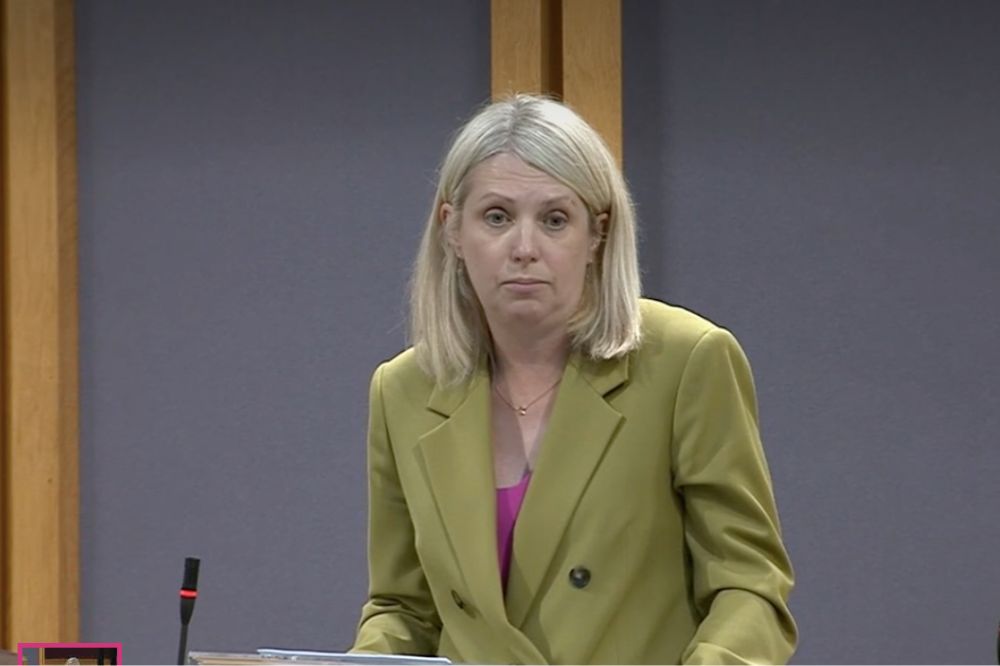Hannah Blythyn leads debate on Welsh economy

Emily Price
Labour backbencher Hannah Blythyn has led a debate in the Senedd on how the Welsh Government can use devolved levers to boost the economy.
Speaking in the Welsh Parliament on Wednesday (September 25), the Delyn MS called on ministers to strengthen fair work expectations for organisations in receipt of public funds and for a clear trajectory to insource public services.
Opening her debate she said she could have used her time on the floor of the Chamber to call for fairer funding for Wales or the devolution of the Crown Estate which would be a “game changer” for Wales.
But instead, she said she wanted to focus on what Wales can do with the levers it already has.
Ms Blythyn said: “Whilst we naturally want to create as many decent jobs as possible, it must be about the quality of those jobs not simply the quantity.
“Public money should not go to companies who do not align their own principles with the Welsh Government’s position on fair work.
“The Economic Contract has evolved, but in my view it could and should go much further – any organisation receiving public funds should as a minimum: be committed to paying at least the Real Living Wage; offer all of their workers contracted hours should they want them ;and allow access to trade unions and promote trade union membership.
“The public sector is core not just to providing the services we all depend upon but as a key economic driver. It is where we have the most leverage around fair work and delivering provision in a way which brings broader benefits.”
Timeframe
The Labour MS called for a “clear trajectory and timeframe” for the Welsh Government’s commitment of exploring where service and contracts can “sustainably and affordably be brought back into a strengthened pubic sector”.
The former trade union official said: “I firmly believe we need a significant shift to insourcing by working in partnership with employers and trade unions, a sensible starting point would be a collective agreement to no further outsourcing. Because the reality of outsourcing is that it will nearly always be about their profit not their people.
“Paying and treating people better is positive for productivity, good for growth and enables investment in our town and community centres through providing economic security, stability and improved spending power in those, often smaller independent business that are the lynch pin of local life.
“We often hear talk about growth, but growth for who? And when we talk about the economy, we need to talk more about work. After all, work is the foundation of our economy, our communities and our country.
“So, despite the challenging context, there still remains a real opportunity to work together so that devolution really makes the economy work for workers and Wales.”
People
Plaid Cymru’s economy spokesperson Luke Fletcher said he agreed with the comments made by Ms Blythyn but added that Welsh people should be the focus when measuring economic success.
He said: “Wales won’t be an economic superpower. We’re not going to be rivalling the likes of the US and China in a traditional sense, and that’s completely fine.
“But if we start measuring what is of value to the people in our economy—so, whether they have a fulfilling life and work in jobs that they actually enjoy, whether they have disposable income and have a life that they can enjoy—you’ll find quite quickly that the rankings, worldwide, of global economies changes, it almost flips. The G7 is no longer the G7; the G7 is further down the list because of the lack of focus on people.”
Contributing to the short debate, Labour backbencher and trade unionist Mike Hedges said the number of companies that have come to Wales for five or 10 years who had substantial government grants and then walked away again is a “disgrace”.
He said: “Welsh Government funded bodies and local authorities should, at the end of contracts, look to bring contracted-out services back in house.”
UK Government
Responding to the debate, Cabinet Secretary for Economy Rebecca Evans said that economic growth and a focus on workers’ rights could only be achieved in partnership with the the UK Government, the private sector, the public sector and trade unions working together.
She said: “We are working with the UK Government to deliver the biggest upgrade to workers’ rights in a generation, through the delivery of Labour’s transformative new deal for working people.
“We are pleased by the UK Government’s clear commitments to introducing an employment rights Bill, covering areas such as the banning of exploitative zero-hours contracts; to guarantee basic rights at work from day one; and to ensure stronger enforcement through establishing a new fair work agency.
“These measures will make work fairer, safer and more secure for all, and are critical to a healthy, functioning and productive labour market and economy. The employment rights Bill will impose legally enforceable rights and duties on many areas that we have been trying to promote and encourage in Wales through our more limited devolved powers.”
She added: “We want to prioritise spending Welsh money in Wales, supporting Welsh companies wherever possible – companies that employ people and provide jobs and training in a local supply chain. When we spend Welsh taxpayers’ money, it should support our local workforce and go into improving people’s lives and opportunities.”
Support our Nation today
For the price of a cup of coffee a month you can help us create an independent, not-for-profit, national news service for the people of Wales, by the people of Wales.





